 |
||
|
Gonzales, here we come!
July 5, 2005 Tucked inside miles of beautiful farmland and vineyards in Gonzales, California is a 22 acre farm owned and operated by John Metzer. It all started years earlier when his father, a teacher by trade, began breeding ducks and geese as a hobby. John earned a degree in Animal Science from UC Davis and opened Metzer Farms in 1978. The rest is history in the making. 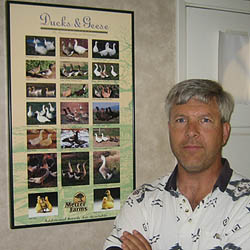
John Metzer, owner of Metzer Farms All about the ducks There are about 10,000 duck breeders and 2,000 goose breeders on the farm. Thousands of ducklings and geese are hatched every day. It's an impressive production requiring several types of equipment and many steps. Metzer Farms currently employs 18 people to help with the day to day operations. The ducks are housed in several areas, with the largest numbers kept in a large greenhouse-like structure called a laying house. There is no swimming water, since it makes it easier to keep their living quarters clean. A mixture of straw and wood shavings is used for bedding. 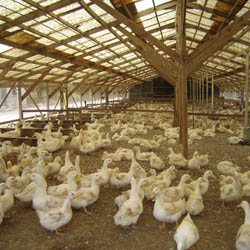 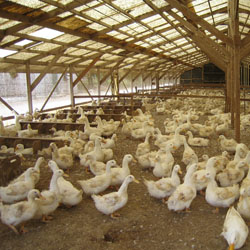
Ducks inside a laying house, note the nesting boxes in rows on the left The ratio of ducks is one male per every five females. Because the female's body forms yolk required for each egg, this typically drains the color from their beaks, making it easier to differentiate them from the males. Ducks drink from large nipple waterers and nest in open boxes, neatly arranged in rows. Geese nest outdoors and require more privacy for egg laying so they are provided with tent-shaped nesting huts. They drink from a different kind of device called a bell waterer. 
Geese need more privacy to lay their eggs 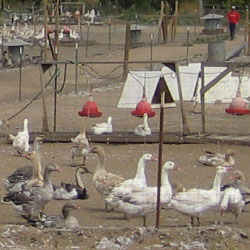
Geese use nesting huts and bell waterers Eggs for days! John showed us several aspects of egg production. Before we were allowed into the hatchery, we were asked to dip our shoes into a sterilizing solution. There are a number of large rooms that serve different purposes. Some house incubators, another is where candling is done, some are used for hatching, some for storage and others for preparation of craft eggs. Everything is kept very clean to prevent bacteria growth. 
One of several buildings that house Metzer Farms hatchery and incubation Every day the eggs are collected from the laying houses and put into large redwood incubators, which are much bigger than an average refrigerator. Inside the incubators are pull-out shelves. After a week, the eggs are carefully removed one shelf at a time for candling. In a darkened room the trays are placed on a light box which illuminates the eggs from underneath. 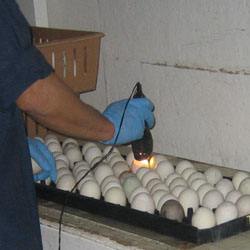
Candling eggs to see if they are fertile A bright light is passed over the tops of the eggs. Infertile eggs are either blown out (for craft use) or disposed of. Fertile eggs are returned to the incubator where they will remain in 99.5° heat for another 3 weeks or so. Metzer Farms candles about 25,000 eggs every week. 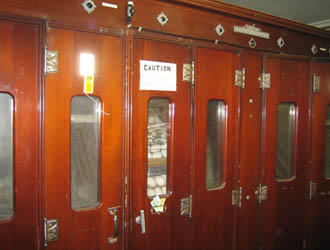 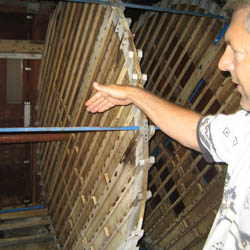
John shows us some of his egg incubators and how a paddlewheel works to circulate the heat One of the older incubators John uses has what's called a paddlewheel inside. The air is circulated by large wheels turning inside the incubator. The other incubators use more modern incubation technology, but John says they both work very well. 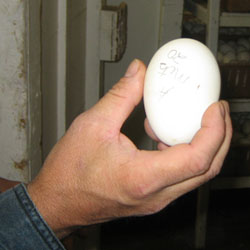
One of the eggs in production A crafter's dream Goose eggs are also an important part of the business. With crafters and hobbyists demanding large eggs for projects, John has an entire room dedicated to preparing infertile goose eggs. After waiting a week to allow the yolk to thin, a small hole is hand-drilled into the top of each egg. From there they go onto a machine that looks like a row of sharp spikes. The eggs are placed hole-first over the spikes where the yolks are blown out. 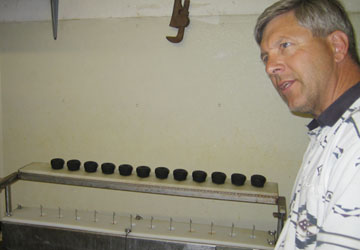 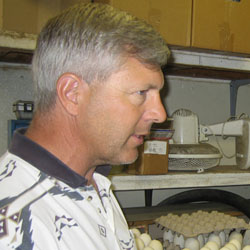
John explains how goose eggs are processed for craft use 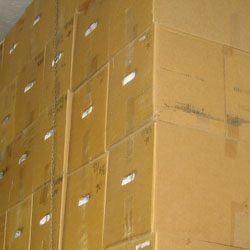
These eggs are ready to ship After the eggs are emptied out a cleaning solution is injected. The eggs are further cleaned and dried, and go into storage boxes, ready to be shipped to artists and retail stores. Ducklings, ducklings and more ducklings! Metzer Farms breeds and sells live ducklings and breeder ducks. They offer several breeds, including hybrids John produced, like the the Golden 300 and White Layer ducks. Typical breeds include Pekins, Mallards, Rouen, Khaki Campbell, White Crested and Buff Orpington. Hatching eggs are also sold to people or hatcheries who want to incubate them and watch the miracle of birth. Most of the ducks hatched are Pekins. The ducklings are kept in crates that stack while they await the shipping process. Ducks are shipped in quantities of 10 or more. They are sometimes sent with a product called Oasis, which provides water during transport, something like a water soaked pellet that's safe for ducklings to ingest. Metzer Farms supplies ducks and eggs to some of the country's largest hatcheries. 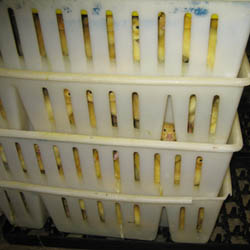 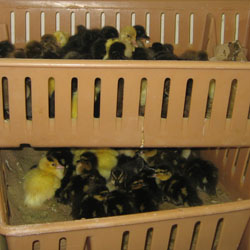
Ducklings are briefly stored in stackable bins 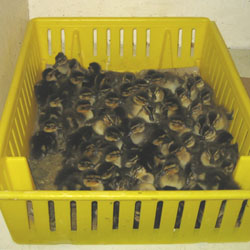 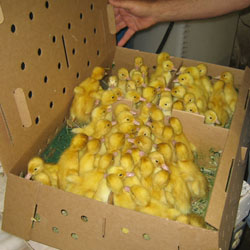
Mallard ducklings; Pekin ducklings in the box and getting ready for shipment Some ducklings are sent out to major retailers, pet stores and private parties. Those destined to be kept as pets are sent with care instructions. Only the eggs will do One thing I found very surprising was that John and his family do not eat their own ducks. They eat the cracked fresh eggs, since a duck's egg has very strong membrane and they do not leak. They also do not slaughter any ducks on the farm which was a big relief! What domestic ducks are supposed to eat After seeing the hatchery and laying houses we toured some of the outdoor operations. The food the ducks and geese eat are stored in huge feed silos. There are several kinds of food available including starter and grower feed. Metzer Farms sells feed in multiple sizes and it is available by mail order.  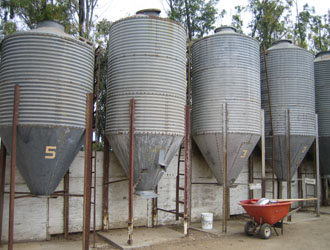
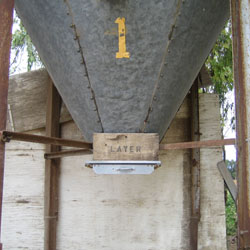 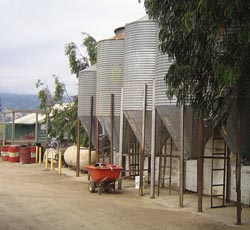
Huge storage silos are used for the various types of feed Metzer Farms uses and sells We bought a bag of starter feed for our ducks, since all we can get in our area is A/P Lay Mash, which is food suitable for an adult duck. John said that was an excellent food for long term health, and noted that pellets are desireable because in the process of making a pellet, the heat kills bacteria. He recommends starter feed for ducklings which contains 20-22% protein. For teens he says grower food is less protein concentrated, containing 16%. Adult ducks do well on 16-18% when they are laying and 14-16% if they aren't laying. It was a very interesting visit. John Metzer was very nice and answered all of our questions. We talked about animal rights and some of the issue facing farmers. It's not an easy thing to balance ethical animal care with making a living, but John seems to have mastered the concept. We were very impressed with his operations and look forward to returning for a visit the next time we're near Gonzales. As for tours for general public? He says they don't do tours any longer, but you can get a good idea of what's going on from his website www.metzerfarms.com. Be sure to say Live Ducks sent you!
26000 Old Stage Road Gonzales, CA 93926 USA 800-424-7755 |
||